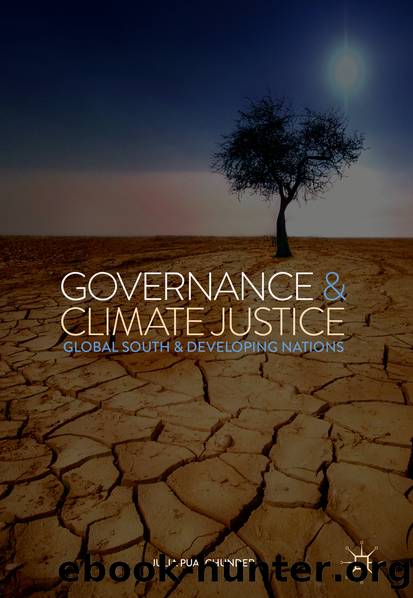Governance & Climate Justice by Julia Puaschunder

Author:Julia Puaschunder
Language: eng
Format: epub
ISBN: 9783319632810
Publisher: Springer International Publishing
8.2 Theoretical Background
8.2.1 Climate Change
Climate change is the change in average weather conditions, which is currently observed in climate record data and predicted to be long-term. The term ‘climate change’ was proposed by the World Meteorological Organization in 1966 to encompass all forms of climatic variability on time-scales longer than 10 years but regardless of cause (Hulme, 2016). Internal and external forcing mechanisms are attributed to cause global warming. Internal forcing mechanisms are natural processes within the climate, such as thermohaline circulation. External forcing mechanisms can be either human-caused—such as human-made greenhouse gas emissions—or natural based on the solar output, the earth’s orbit and volcano eruptions. Today, climate change monitoring and resilience is foremost incorporated in the title of the Intergovernmental Panel on Climate Change (IPCC) and the UN Framework Convention on Climate Change (UNFCCC).
The contemporary climate change discourse is widely focused on the measurement of climate change, the contributing forcing factors to global warming and the ample effects a heating up earth will have on humans, animals and the natural habitat now and for centuries to come. Currently, 2016 records as the warmest year in the NASA/NOAA temperature since 1880 when temperature measurement started (Potter, Cabbage, & McCarthy, 2017). Global warming is also found in Asian monsoon records, Northern Hemisphere temperature recordings, Alpine glacier extent and Arctic temperature anomalies over a 100-year period as estimated by NASA.6 The impacts of climate change are reported to be unpredictable. The scientific literature mentions rising sea level, tide changes, coral reef destruction, soil, vegetation and precipitation changes, rainforest collapse, habitat isolation and the extinction of plants and animal species, but also drought, pests, diseases and forest fire imposing additional threats to human, animals, vegetation, forests, oceans, sediments and their populations around the world (Konnert et al., 2015).
The contemporary climate consequence literature is coupled with insights on how to avert global warming in climate change mitigation and adaptation efforts in the global governance, legal, research, public administration and policy domains (Nordhaus, 1994; Puaschunder, 2018). Case studies and teaching insights follow (Engel, Short, Jennings, Orttung, & Suter, 2017; Helm, 2009; Nordhaus, 1994). Ethical imperatives and human rights consequences are currently derived from the insights on global warming (Ferreira, 2017; Pope Francis, 2015; Puaschunder, 2016d, 2017b, 2017c; Rawls, 1971). Adding onto contemporary climate fund-raising strategies ranging from emissions trading schemes (ETS) and carbon tax policies to financing climate justice through bonds as viable mitigation and adaptation strategies, climate justice is introduced to comprise fairness within a society, between countries and also over generations (Puaschunder, 2016d, 2017b, 2017c). In all these writings information about the gains of global warming appears to be missing. A primary focus on the downsides of global warming, however, is critical in light of human tendencies of loss aversion and stakeholder engagement needs for solving an as novel and complex challenge as climate change appears to be imposing (Puaschunder, 2010).
Download
This site does not store any files on its server. We only index and link to content provided by other sites. Please contact the content providers to delete copyright contents if any and email us, we'll remove relevant links or contents immediately.
International Integration of the Brazilian Economy by Elias C. Grivoyannis(111059)
The Radium Girls by Kate Moore(12028)
Turbulence by E. J. Noyes(8050)
Nudge - Improving Decisions about Health, Wealth, and Happiness by Thaler Sunstein(7707)
The Black Swan by Nassim Nicholas Taleb(7129)
Rich Dad Poor Dad by Robert T. Kiyosaki(6633)
Pioneering Portfolio Management by David F. Swensen(6301)
Man-made Catastrophes and Risk Information Concealment by Dmitry Chernov & Didier Sornette(6019)
Zero to One by Peter Thiel(5802)
Secrecy World by Jake Bernstein(4753)
Millionaire: The Philanderer, Gambler, and Duelist Who Invented Modern Finance by Janet Gleeson(4478)
The Age of Surveillance Capitalism by Shoshana Zuboff(4293)
Skin in the Game by Nassim Nicholas Taleb(4250)
The Money Culture by Michael Lewis(4207)
Bullshit Jobs by David Graeber(4191)
Skin in the Game: Hidden Asymmetries in Daily Life by Nassim Nicholas Taleb(4007)
The Dhandho Investor by Mohnish Pabrai(3765)
The Wisdom of Finance by Mihir Desai(3748)
Blockchain Basics by Daniel Drescher(3583)
